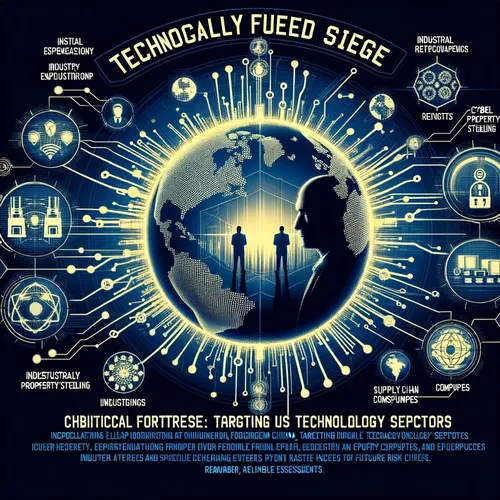Silicon Smackdown: China's Tech Offensive Turns Up the Heat on US Titans
- Author
- Quiet. Please
- Published
- Tue 19 Aug 2025
- Episode Link
- https://www.spreaker.com/episode/silicon-smackdown-china-s-tech-offensive-turns-up-the-heat-on-us-titans--67443035
This is your Silicon Siege: China's Tech Offensive podcast.
I’m Ting, your favorite cyber sleuth reporting straight from the frontlines of Silicon Siege. Buckle up, listeners—no preamble, just pure drama from the last two weeks of China’s tech offensive targeting America’s prized technology sectors.
Let’s hit the ground running: The past few days saw another spike in Chinese state-sponsored hacking, this time zeroing in on Microsoft’s cloud infrastructure. According to Microsoft, a group of Chinese “threat actors” exploited vulnerabilities in SharePoint servers, swiping sensitive business data and, in some cases, proprietary intellectual property. The company flagged these intrusions as “sustained,” showing not only technical expertise but a clear intent to siphon competitive intelligence for Beijing. What’s really spicy? The attackers used a blend of supply chain compromise—deploying weaponized updates to third-party cloud plugins—and classic spearphishing. That’s hitting two birds with one stone: stealing data and undermining trust in US cloud ecosystems.
Turning to chips, the real drama comes courtesy of Nvidia, which has become the unlikely poster child for geopolitical chess. The US, after months of heated debate, flipped the switch: President Trump lifted the ban on Nvidia and AMD chips going to China, slapping a whopping 15% export tax. But don’t pop the champagne yet. Chinese state media practically declared the H20 chip a ‘Trojan Horse,’ accusing Nvidia of embedding backdoors and remote kill switches. Beijing summoned Nvidia brass, demanding to know if these chips could give Uncle Sam a peek into sensitive AI workloads or trigger secret shutdowns. Nvidia’s CSO David Reber Jr. denied these claims, but the suspicion fueled Beijing’s drive to kickstart domestic production of AI silicon, with Huawei’s CloudMatrix rack and DeepSeek’s troubled launches making headlines. Tencent, meanwhile, shrugs—already sitting on a chip hoard big enough to power a cyberpunk city.
On the espionage front, it’s getting theatrical. The FBI just arrested two more Chinese operatives for allegedly stealing trade secrets related to dual-use tech—think military-grade lithium batteries and next-gen materials. This fits the pattern described by strategypage.com: Chinese economic espionage is bolder than ever, targeting commercial and defense sectors alike. US industrial insiders, like Anne Neuberger at the Hoover Institution, warn that America’s critical infrastructure—from hospitals to power grids—remains on the digital frontlines and dangerously under-prepared. She argues that a lack of offensive cyber muscle means every attack chips away at US strategic resilience, especially if things escalate near Taiwan.
Looking ahead, industry experts like Chris Cytera at CEPA see export controls as a short-term fix with long-term pain: every embargo pushes China closer to tech independence. The real strategic implications? China keeps hacking, pilfering, and rebuilding—in time, eroding US advantages in semiconductors, AI, and supply chain security.
So, listeners, as the silicon siege grinds on, it’s not about if China will strike again—it’s about when, where, and how deep the roots already run. Thanks for tuning in to my tech detective dispatch! Don’t forget to subscribe for future drops.
This has been a quiet please production, for more check out quiet please dot ai.
For more http://www.quietplease.ai
Get the best deals https://amzn.to/3ODvOta
